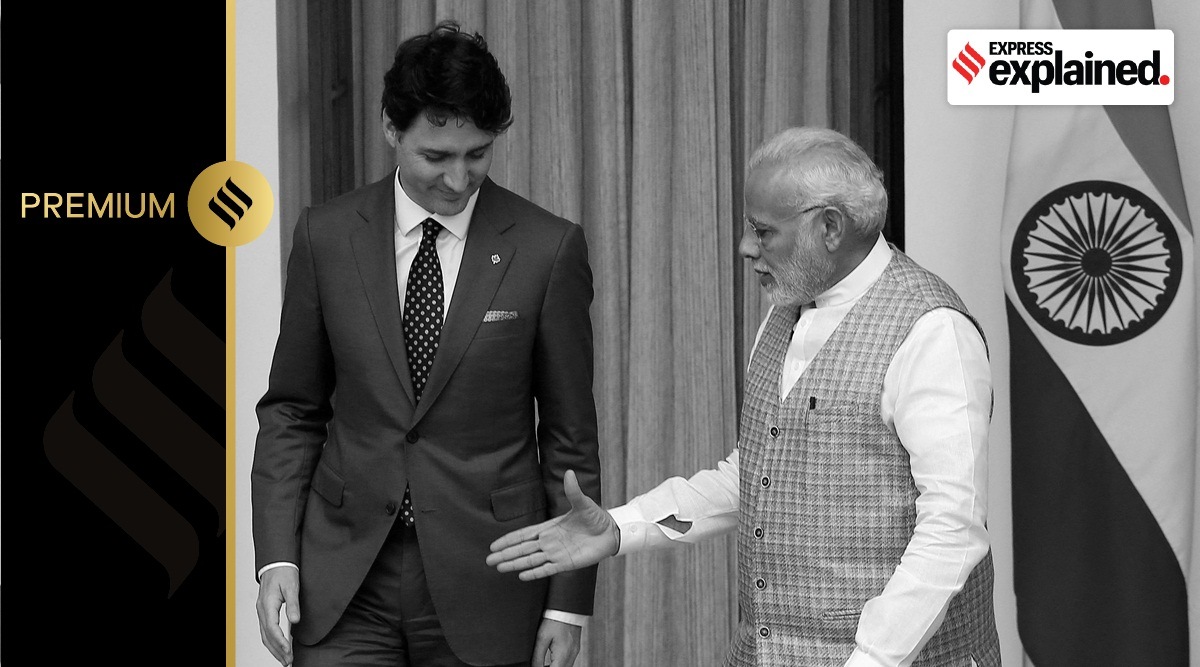Expert Explains | View from China on India-Canada spat: ‘US to blame, India should see West’s hypocrisy’
The growing diplomatic row between two democracies has been drawing a lot of attention in China, which has no love lost for India or Canada. Here are some of the prevalent views.
 Indian Prime Minister Narendra Modi (R) extends his hand for a handshake with his Canadian counterpart Justin Trudeau during a photo opportunity ahead of their meeting at Hyderabad House in New Delhi, India, February 23, 2018. (REUTERS/Adnan Abidi/File Photo)
Indian Prime Minister Narendra Modi (R) extends his hand for a handshake with his Canadian counterpart Justin Trudeau during a photo opportunity ahead of their meeting at Hyderabad House in New Delhi, India, February 23, 2018. (REUTERS/Adnan Abidi/File Photo) On September 18, Canada’s Prime Minister Justin Trudeau triggered what is being viewed as an unprecedented “chill” between two friendly democracies. Addressing the Canadian parliament, Trudeau alleged New Delhi’s involvement in killing a Canadian citizen on Canadian soil. The accusation instantly sent India-Canada relations plunging, as both the countries expelled a senior diplomat in a tit-for-tat manner. The growing diplomatic row between the two Commonwealth nations has been drawing a lot of attention in China, which has no love lost for India or Canada.
While most India-related things are widely debated on social media and in op-ed columns in China, the reason many are watching the current row with great interest is also that Beijing experienced diplomatic hostility with Ottawa just a few months ago, and since then, many Chinese dislike Canada and Trudeau.
‘US to blame’
The prevailing impression of India in China is of an “ unfriendly nation which is friends with the US”, while Canada is seen as a “hostile country which acts as the 51st state of the US.” Therefore, many articles on the India-Canada spat are devoted to the “double standards” and “hypocrisy” of the USA.
China’s pro-Beijing hawkish English language tabloid, Global Times (GT), published five news reports in three consecutive days over the spat. All five features were less focused on New Delhi and Ottawa and more on “exposing US double standards”. Three commentaries were headlined as “Escalating India-Canada spat highlights hypocrisy of US values-based alliances,” “Collective silence on Canada-India spat showcases West’s ‘typical double standards’,” and “As Canada-India diplomatic row escalates, US finds itself in a dilemma.”
Quoting Li Haidong, a professor at the Foreign Ministry-run Foreign Affairs University in Beijing, the GT warned New Delhi that the incident is a timely reminder that given the West’s ideological differences [with India] and its colonial mindset, “it is impossible for them to cooperate with India on equal footing.”
‘India in trouble’
The semi-official but pro-establishment online news platform, Guancha.cn, in its lead foreign affairs story “Falling out? Western countries launch India seize” on September 20 put the blame on Canada for provoking India. “Canada lacks strategic autonomy in defence and security and needs to rely on the United States in exchange for its own security. In recent years, to show its loyalty to the United States in order to win the favour and trust of the US, Canada has been provoking China too. Now, instigated by the US, it is causing trouble for India,” Guancha.cn commented.
Quite a few digital news platforms leaning towards the orthodox Left ideologically have described the tensions as “India in for big trouble.” Citing remarks made by Jocelyn Cullen, a former aide to Justin Trudeau, a leftist blog in Beijing that was uploaded by several news websites wrote: “Canada’s accusation will have a ‘bomb-like impact’ around the world, which will make India be regarded as ‘a national group that assassinated political opponents abroad.” Decoding Cullen’s anti-India above remark, the Chinese commentary claimed, “If Canada goes on to prove India’s hand in the killing, it would mean India could be classified in the West among ‘terrorist’ countries along with Iran, Cuba, Syria, and Russia.”
‘West needs India in anti-China groups’
Opinions in the reader’s comments sections on news websites reveal another stand.
Here are some readers’ comments taken from the Global Times, Guancha.cn, and 163.com: “Chinese people should be careful when siding with India… America needs Indian shoulders to fire on China and Russia, so America will pardon every sin done by India”; “As long as India persists in its anti-China stance, Little Potato [reference to Trudeau] will eventually compromise and take the initiative to relax”; “Without China, no country in the world would accommodate India. India is just a pawn that Western countries want to use.”
Finally, some Chinese people seem in no hurry to take positions, but are just enjoying the plummeting of ties between two allies of America. Some even claimed that “China’s development and rise have shown India’s value to the West, we should therefore avoid anything that enhances India’s strength and influence.”
In Guancha.cn’s readers’ views column, a Chinese person used an ancient proverb and wrote: “Sitting on the mountain and watching tigers fight, it’s great fun!”
To conclude, it is indeed interesting that even 10 days after the India-Canada tussle was set off, the Chinese media and public discourse remains occupied with the issue. But what is also true is that most people in China do not expect “Little Potato” to pursue the matter to its logical end. They believe the spat is entirely the result of US President Joe Biden favouring Prime Minister Narendra Modi too much in order to contain China, thereby “emboldening” him.
Hemant Adlakha teaches Chinese at the Jawaharlal Nehru University in New Delhi. He is also Vice Chairperson and Honorary Fellow, Institute of Chinese Studies (ICS), Delhi.
- 01
- 02
- 03
- 04
- 05






































